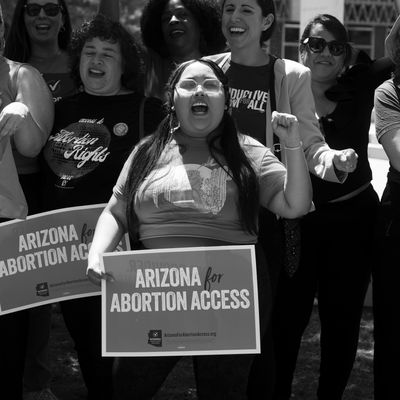
On Wednesday, the Arizona Senate voted to repeal the state’s Civil War–era abortion ban, with two Republicans crossing party lines to overturn the measure. It’s a rare example of lawmakers responding to mounting public outrage over near-total abortion bans since Roe v. Wade was overturned nearly two years ago. The bill now goes to Democratic governor Katie Hobbs, who said she’ll sign it into law.
Abortion access in Arizona has been in flux since last month, when the State Supreme Court ruled that an abortion ban from 1864 — before Arizona was a state and decades before women were allowed to vote — could go into effect later this summer. The 160-year-old measure only makes an exception for saving the life of the pregnant person and makes it a felony to perform or help someone obtain an abortion. Those who violate the law face two to five years in prison.
Shortly after the ruling, the Republican-controlled state legislature blocked Democrats’ efforts to repeal the ban on two occasions. Then, on April 24, three Republican state House lawmakers voted with every Democrat in the chamber to repeal the law. During debate on Wednesday, Republican state senator Anthony Kern called the 1864 law “the best abortion ban in the nation.” But his colleagues have scrambled to defend the near-total ban, as the state Supreme Court’s decision sparked outrage across the nation and galvanized a campaign to give voters the chance to codify abortion rights in the Arizona Constitution in November.
Abortion is currently legal up until 15 weeks of pregnancy in Arizona, and access will change a few times in the coming months despite the repeal. For now, the 1864 ban is still expected to go into effect on June 8. “We have rules here where a bill cannot take effect until 90 days after our legislative session ends,” says Eloisa Lopez, executive director of the Abortion Fund of Arizona. “So even if the governor signs the repeal in the next five days, it still can’t actually start the process of implementation until our legislative session ends.” Last year, the session did not wrap up until late June, she added. “If that happens again, you’re looking at the ban being into effect until mid to late September.”
Planned Parenthood Arizona filed a motion with the State Supreme Court following the repeal that asked the justices to wait to issue their final order in the case until the 90-day clock runs out and the repeal takes effect. That way, there would be no pause in services. “The court’s April 9 ruling was both tragic and wrong, but it rested on trying to discern legislative intent,” Angela Florez, president and CEO of Planned Parenthood Arizona, said in a statement. “The legislature has now spoken and clearly does not want the 1864 ban to be enforced. We hope the court stays true to its word and respects this long-overdue legislative action, by quickly granting our motion to end the uncertainty over the future of abortion in Arizona.”
If the court denies the motion, it’d mean that for several months, patients would be forced to self-manage their abortion, seek care in out-of-state clinics that are already overwhelmed, or continue their pregnancies against their will. Lopez says it already costs between $1,000 and $2,000 to send a patient out of state for care, because the group covers the procedure as well as offering practical support including transportation, lodging, and meals.
That means for several months, patients will be forced to self-manage their abortion, seek care in out-of-state clinics that are already overwhelmed, or continue their pregnancies against their will. Lopez says it already costs between $1,000 and $2,000 to send a patient out of state for care, because the group covers the procedure as well as offering practical support including transportation, lodging, and meals.
“We have been helping people travel for abortion care since we started in 2017,” Lopez says. “We already have infrastructure and clinic relationships. We already know what it takes to make it happen for people, but now we are just being faced with making it happen for as many people as possible.” She is also concerned about how the ban will impact abortion providers while it’s in effect, noting that some clinics could close down if they can’t offer care for several months and that reopening would be financially and logistically difficult.
Once the repeal does go into effect, abortion access in Arizona will again be subject to the 15-week ban. Lopez says the fund will continue fighting for patients and actively fundraise to support as many abortion seekers as they can. “This really is a labor of love, to support patients,” she says. “The landscape continues to get worse. Helping us support people’s abortion care is crucial right now.”
This story has been updated.
The Cut offers an online tool that allows you to search by Zip Code for professional providers, including clinics, hospitals, and independent OB/GYNs, as well as abortion funds, transportation options, and information for remote resources like receiving the abortion pill by mail. For legal guidance, contact Repro Legal Helpline at 844-868-2812 or the Abortion Defense Network.





